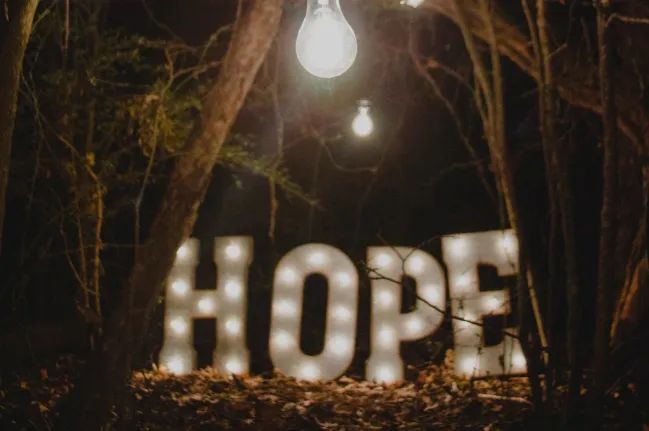
Hope in Uncertain Times
May 2020 | by jolane flanigan
As I type, my daughter is doing PE in the living room with her class. We have been working from home for almost a month, and our days now have a familiar rhythm marked by meal breaks and dog walks. In our region, we seem to have warded off the massive healthcare crises that COVID-19 has created in other areas, but we are not escaping other impacts. Many are out of work and experiencing economic uncertainty and hardship. Others are concerned about loved ones or their vulnerability to this novel coronavirus. These are uncertain times.
As a professor of interpersonal communication, I talk with students about uncertainty and people’s differing abilities to manage it productively. It turns out, most of us don't like uncertainty, and in our attempt to reduce it, we can fall into unproductive efforts to control things we cannot control - other people, circumstances, and COVID-19 - either directly or indirectly. As a counselor, I talk with people about managing uncertainty in a way that stresses what we can control: our thinking. The goal is to rewire the brain so that empowering neural pathways are strengthened. Having done this work myself, I can say that it is effective even though it felt counter-intuitive; it required a leap of faith.
As I thought about this leap of faith, I began to think of the First Corinthians verse I learned years ago: Three things will last forever—faith, hope, and love—and the greatest of these is love. It strikes me as odd that the verse, taken from a book of faith, says love is greater than faith, but more on this below. Faith is a trust in something bigger than we are. Even those who identify as atheists believe in a higher order, whether it is based on scientific laws or a culture-based moral code. Practicing faith is adhering to whatever doctrine or belief we subscribe to, even when we lack a complete understanding or object to parts of it. In faith, we take our next best step even when that feels like it’s off the cliff.
When I took a leap of faith away from how I was managing uncertainty, I did so first by having faith in a friend who had walked this new path before me. Now, it's my practice to believe in something bigger than myself. A practice that lessened the stress and anxiety I felt imagining I had to find a way to control the outcome of so many things. Faith is about not having to control because the larger order takes care of these things…even if it doesn't directly benefit us, it is what is. Since it is bigger than us, there is no way to change it in this moment (although we can set a goal to work toward a change).
There is a theory used in the field of positive psychology to treat people with depression who find traditional therapies and medication unhelpful: hope theory. This theory starts with goals. While we all have goals, not all goals are equal. Those of us with learning goals find reward in growth and improving ourselves. We strive to achieve our goals, knowing we will face obstacles and believe we can overcome them by adopting different strategies. Those of us with mastery goals tend to set lower goals we believe we can easily achieve. We don't risk failure, but should we imagine we could fail, we quit. Those of us who set mastery goals feel hopeless, while those of us who set learning goals feel hopeful.
To increase hope, then, we must practice setting learning goals. We set a goal and know there are multiple pathways to achieving that goal. There will be many obstacles, but we will learn how to overcome these obstacles and find new paths. Struggle is good because it is growth, but inflexible struggle is not. Doggedly slogging down the same path, and experiencing the same poor results is not learning. And sometimes, being flexible means asking for help. We admit we don’t know and we are frustrated, scared, or angry, and that we must take a detour to get more information and figure out how to get past the obstacle.
It is here that I imagine some readers may grow upset. When one loses one’s job because of a policy made around a pandemic, the above paragraph seems callous. I remember feeling that and being level 10 angry that the solution to my situation was my mindset when my situation was a material reality. In my experience (and there is research to back this up), changing me changed my material reality. As I grew more flexible in my thinking on how I could achieve my goals, I noticed I understood my goals better and was better able to achieve them. As I grew more forgiving of myself, I was better able to appreciate my effort and became more resilient in my efforts. And then something unexpected happened: I stopped chasing after happiness, and I settled into living happiness.
This is where the greatest of the three enters: love. For as long as I can remember, I have worked to understand the human connection. I've dedicated my entire academic and professional life to it. It is my passion. I have come to see love as a practice of connection. It's a warm glow of appreciation of exactly who a person is. The reason love is the greatest of the three is that the other two require it to grow—faith and hope are about connection to others. In research on positive psychology, we find four common practices used to rewire the brain to be more hopeful, and these are all about connection:
- Three gratitudes a day: If people write down three original things they are grateful for each day, within a month, their brains will grow to automatically see the world and the events in it more positively. I hear this as connecting to the good in our lives and ourselves.
- Meditation: A daily practice of meditation increases our ability to focus and quiets the hum of anxious emotions. This is about connecting to our spiritual self.
- Random acts of kindness: Practicing random acts of kindness grows our connection with others and gives what we want to have in the world. In other words, we practice doing what we want to be. The caveat here is not to do these acts as self or other manipulation. We do them because we enjoy growing positive emotions in us. If we want someone to be more loving toward us, try freely giving some love.
- Exercise: We already know that regular exercise increases the feel-good hormones and lessens the feel-not-so-good hormones, but it also provides us with an opportunity to get out in the world and to notice (and be thankful for) the beauty around us. This practice is a form of “grounding” and has the effect of quieting the nervous system; it’s also about connecting to our natural world.
These practices work because they are about connection. Appreciation and love for all that is around us grows a positive and hopeful brain. Conversely, being stuck in judgment, blame, and anger grows a negative and hopeless brain. Our choice is which one we want to grow. In the end, I’ve come to believe life is about enjoying the journey, asking for help and support when the obstacles get too big, and being thankful for our connections.
Originally printed in the May 2020 issue of Simply Local Magazine
Never miss an issue, check out SLM's digital editions here!





